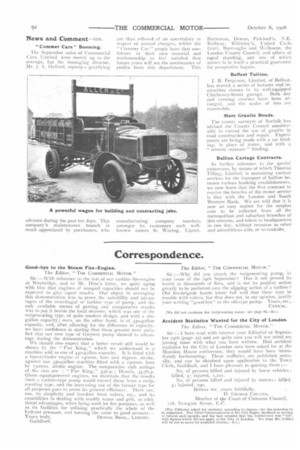Correspondence.
Page 12

If you've noticed an error in this article please click here to report it so we can fix it.
Good-bye to the Steam Fire-Engine.
The Editor, " THE COMMERCIAL MOTOR."
Sir :—With reference to the test of our turbine fire-engine at 1Veybridge, and to Mr. Dine's letter, we quite agree with him that engines of unequal capacities should not be expected to give equal results. Our object in arranging this demonstration was to prove the suitability and advantages of the centrifugal or turbine type of pump, and the only available means of getting any comparative results was to put it beside the local steamer, which was one of the reciprocating type, of quite modern design, and with a 260gallon capacity; ours, on the other hand, is of 350-gallon capacity, and, after allowing for the difference in capacity, we have confidence in stating that those present were satisfied that our new type of Gwynne pump showed to advantage during the demonstration.
We should also expect that a better result still would be shown by the " Fire King," which we understand is a machine sold as one of 450-gallon capacity. It is fitted with a four-cylinder engine of 46mtn. bore and to5nun. stroke, against our 350-gallon machine fitted with a 120MM. bore by r3on-nn. stroke engine. The comparative club ratings of the two are : " Fire King," 53h.p.; Dennis, 35.7h.p. Given equal-powered engines, we maintain that the results from a turbine-type pump would exceed those from it reeipmcating type, and the increasing use of the former type for all purposes goes to prove its general efficiency. Then' are, too, its simplicity and freedom from valves, etc., and its capabilities in dealing with muddy water and grit, as additional advantages, when being used for fire purposes, as well as its facilities for utilising practically the whole of the hydrant pressure, and turning the same to good account.—
Yours truly, DENNIS BROS,, LIMITED, Guildford. The Editor, " Tit COMMERCIAL. MOTOR."
Sir :—Why did you attack the reciprocating pump, in your issue of the 24th September? Has it not proved its worth at thousands of fires, and is not its positive action greatly to be preferred over the slipping action of a turbine? Old ■r hands know full well that there may be trouble witlivalyes, but that does not, in my opinion, justify your writing "good-bye" to the old-type pump. Yours, etc., CYNICAL.
tWe did not condemn the reciprocating pump: see page 81.—En.]
Accident Statistics Wanted for the City of London.
The Editor, " THE COMMERCIAL MOTOR."
Sir :—I have read with interest your Editorial of September 24th (page 22) and am quite sure you will not mind my joining issue with what you have written. Had accident statistics for the City of London area been asked for at the Mansion House conference, they would have been immediately forthcoming. These statistics are published annually, and can be obtained upon application to the Town Clerk, Guildhall, and I have pleasure in quoting them :No, of persons killed and injured by horse vehicles: killed, 5; injured, 1,221.
No. of persons killed and injured by motors : 5; injured, 290. Believe me, yours faithfully,
D. GEORGE COLLINS, Member of the Court of Common Council. No..wgate Street, E.C.
[The Editorial asked for statistics according to classes—for the motorbus to be separated. The Chief Commissioners of the City POPCEu declined in writing to furnish such records, and the fact remains that the confer ce was "foul', with figures which did not apply to the City of London, We hope Mr. Collirs will he one to move for analysed rothrns.—End


















